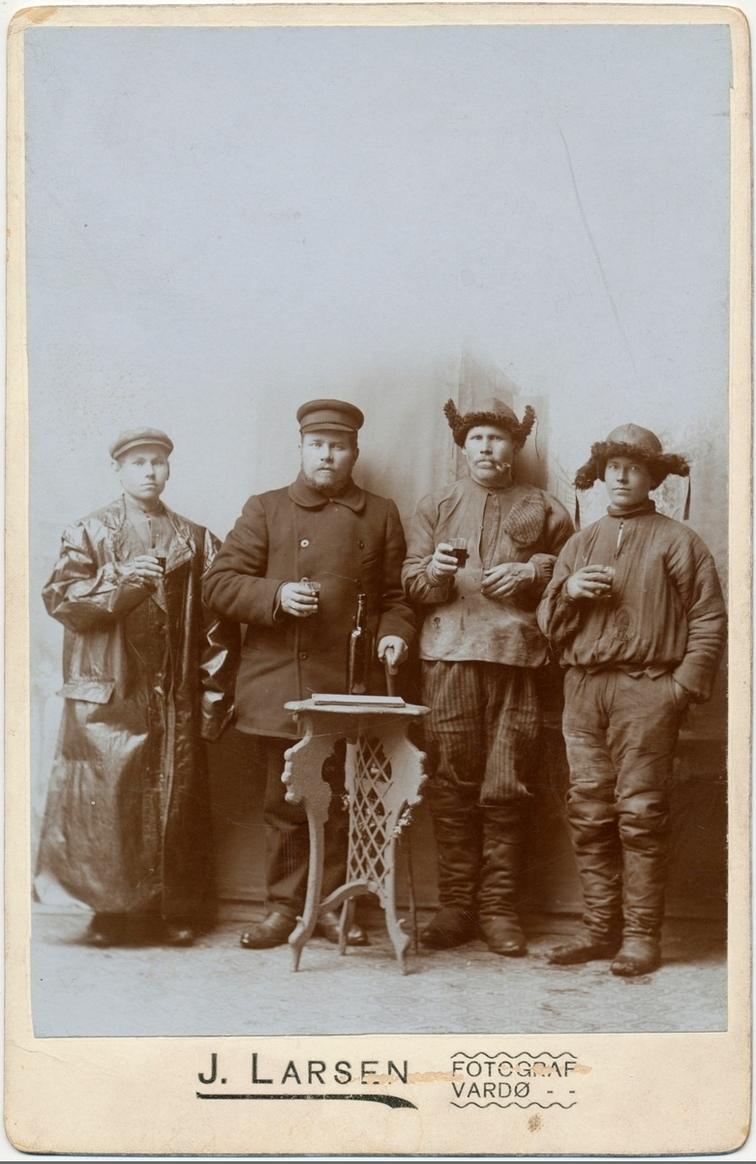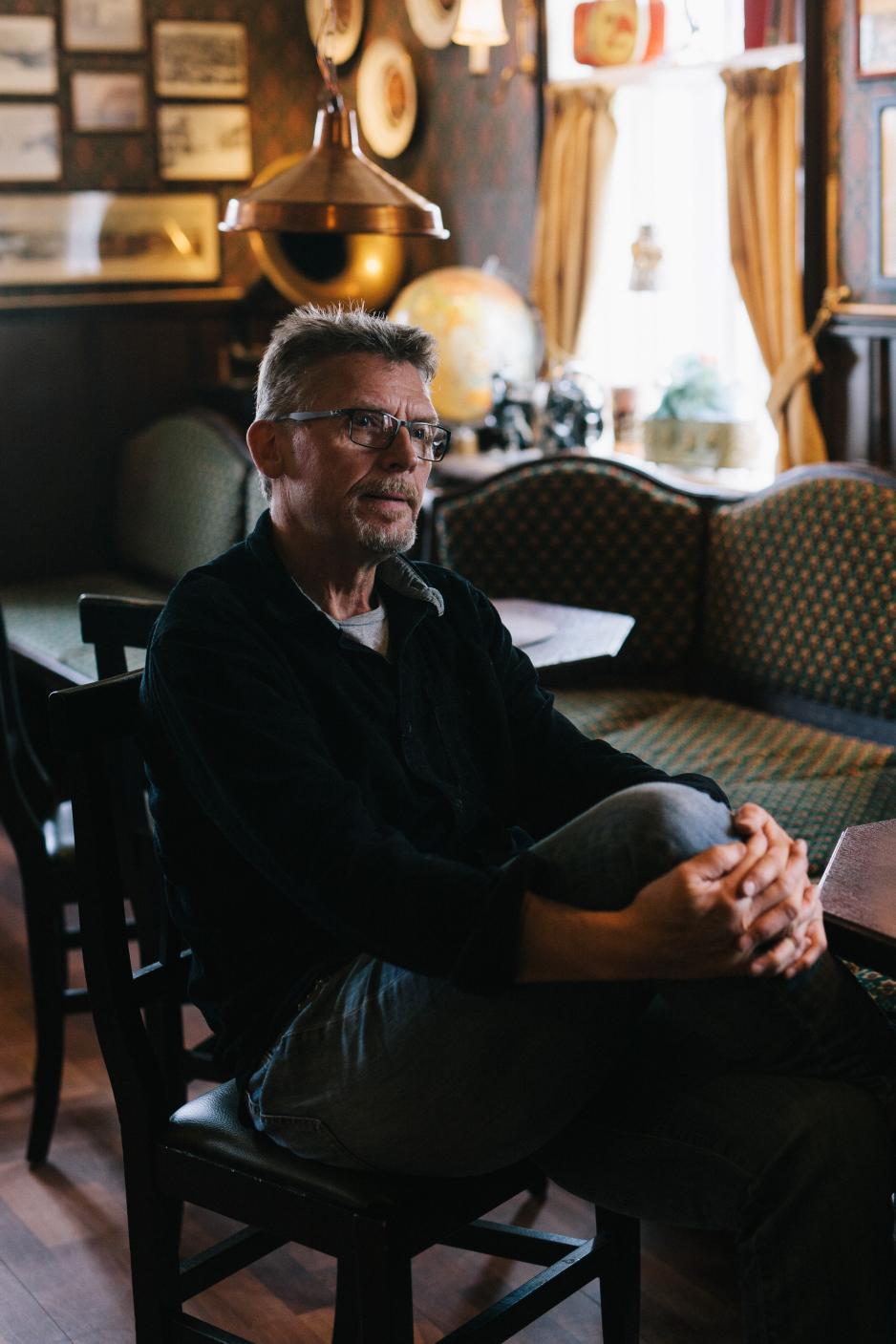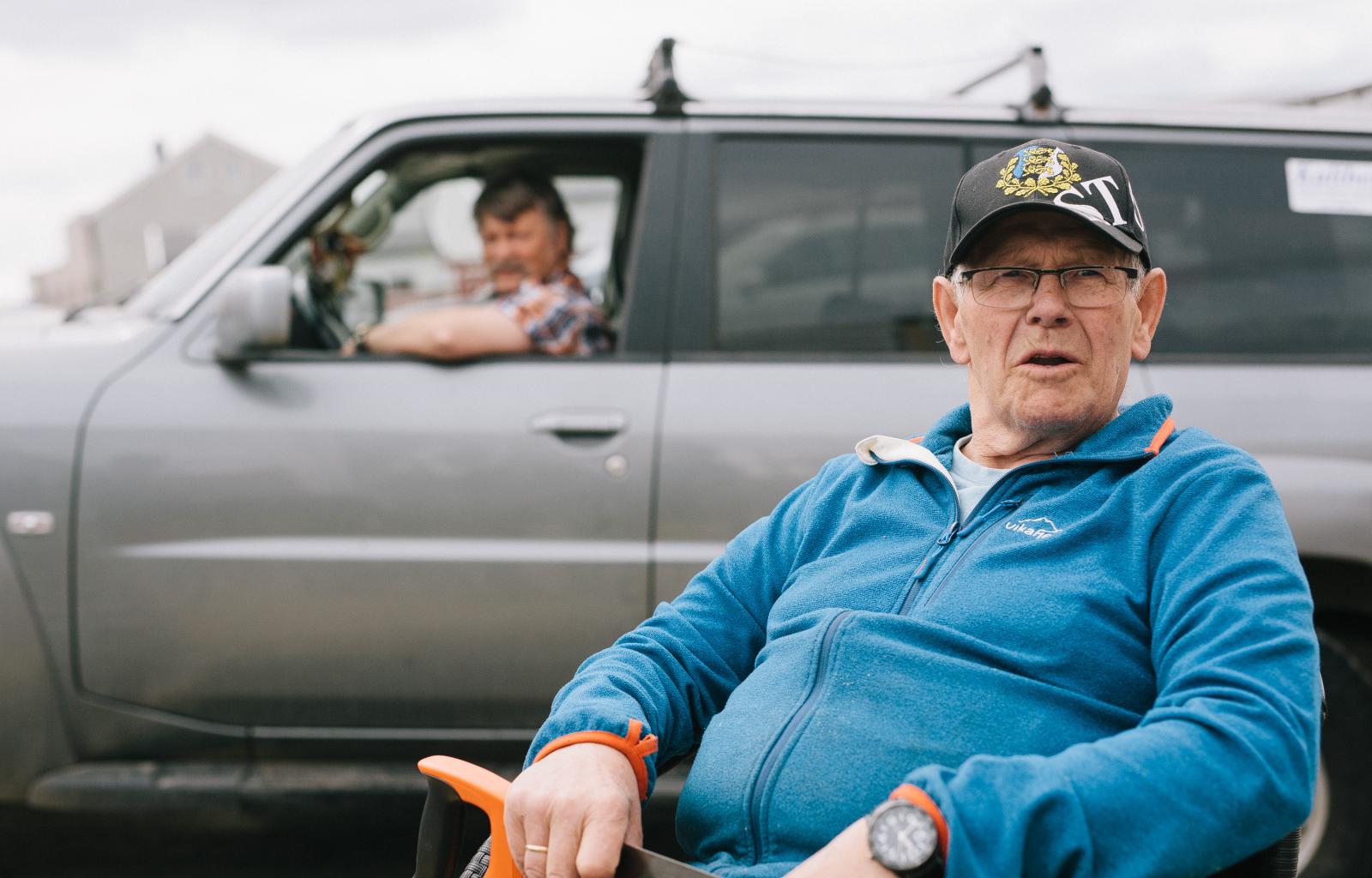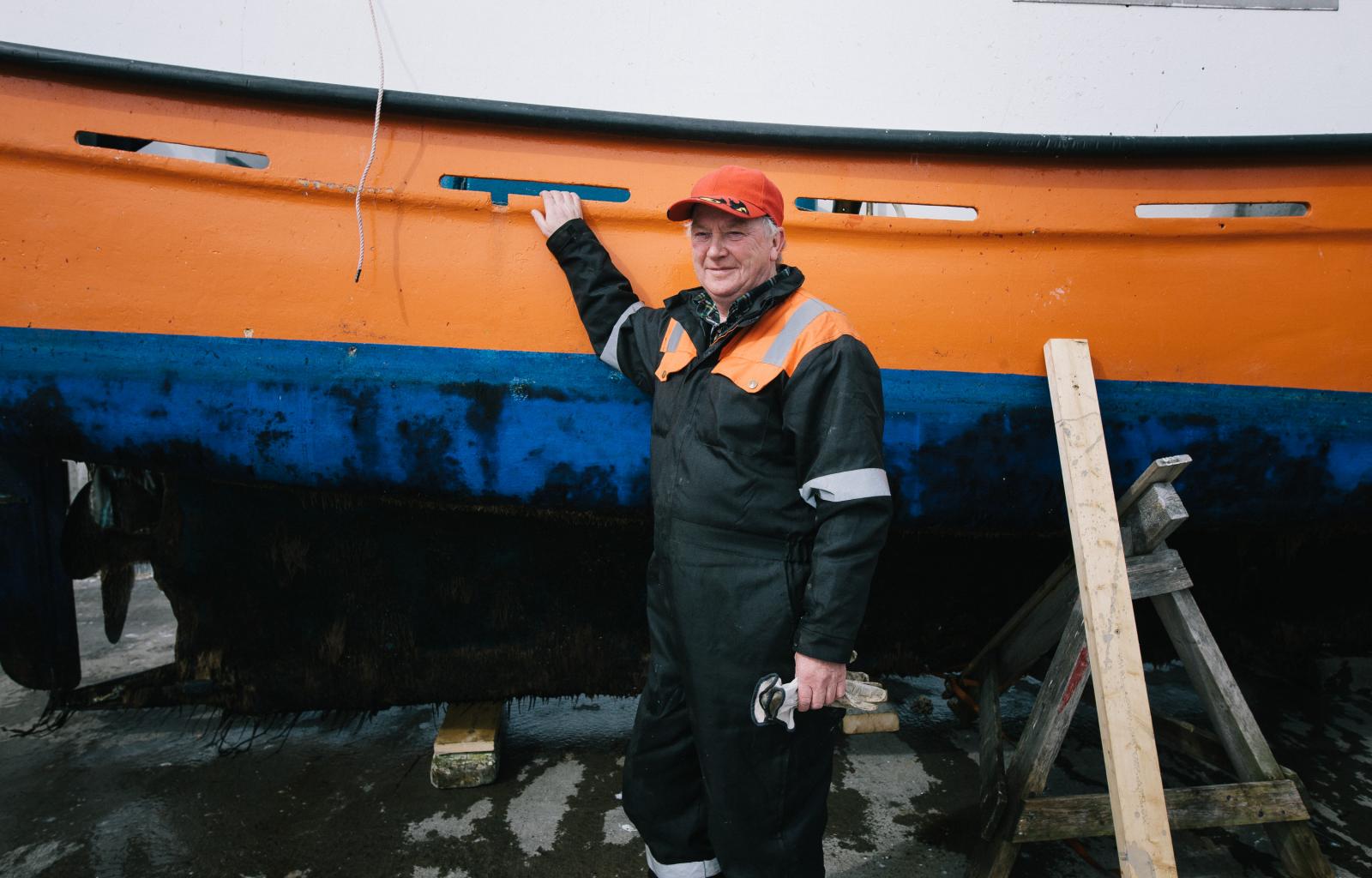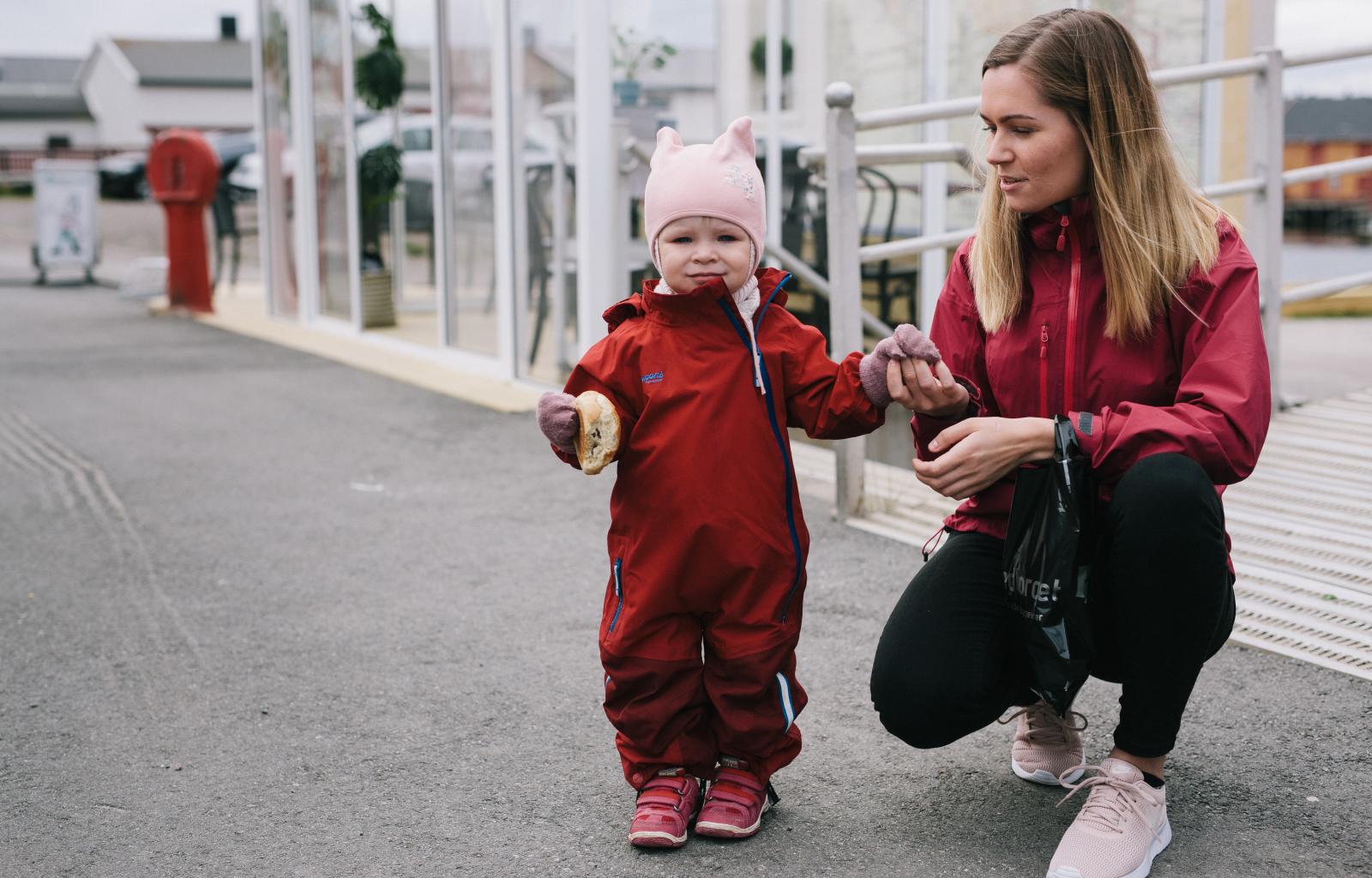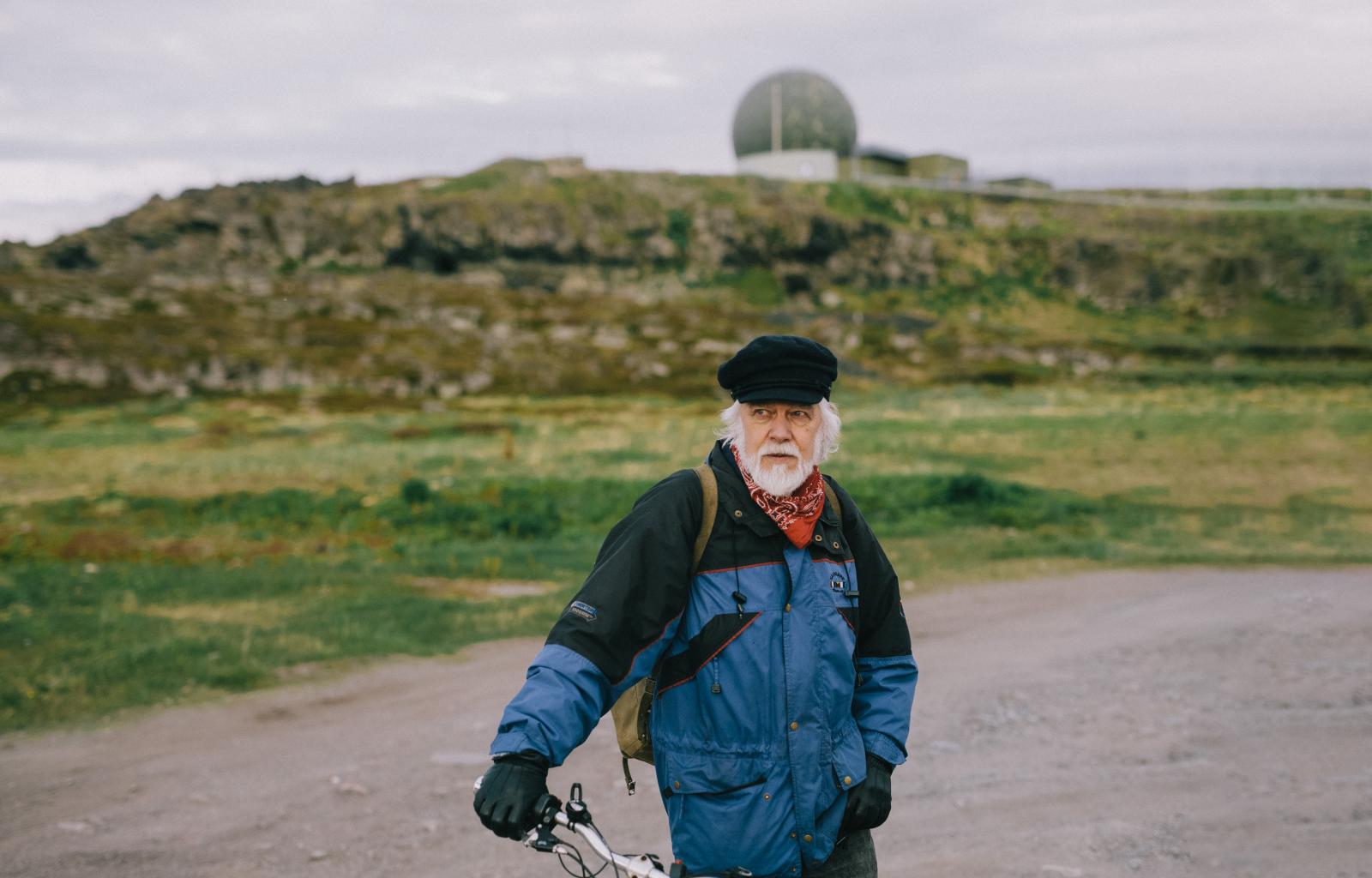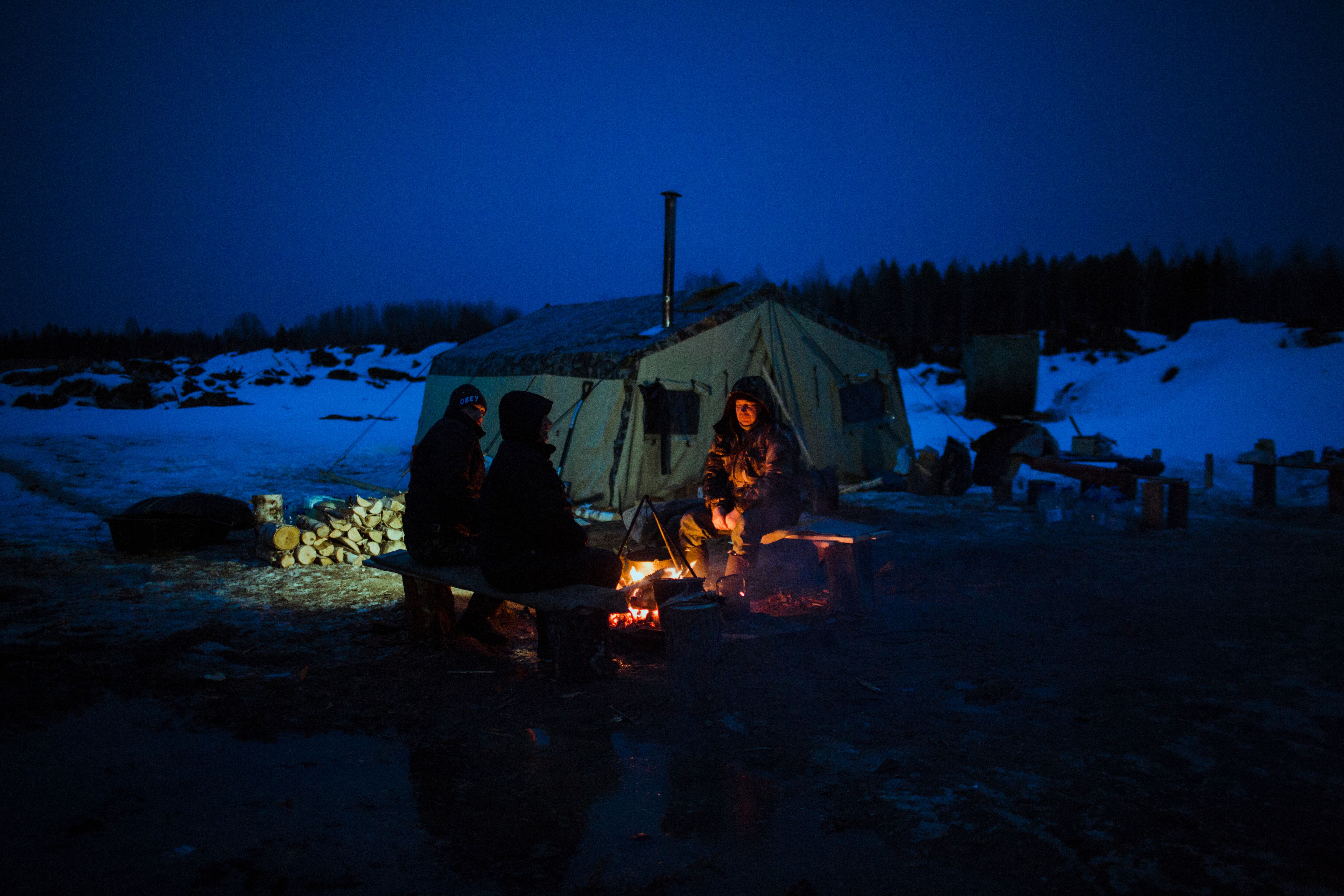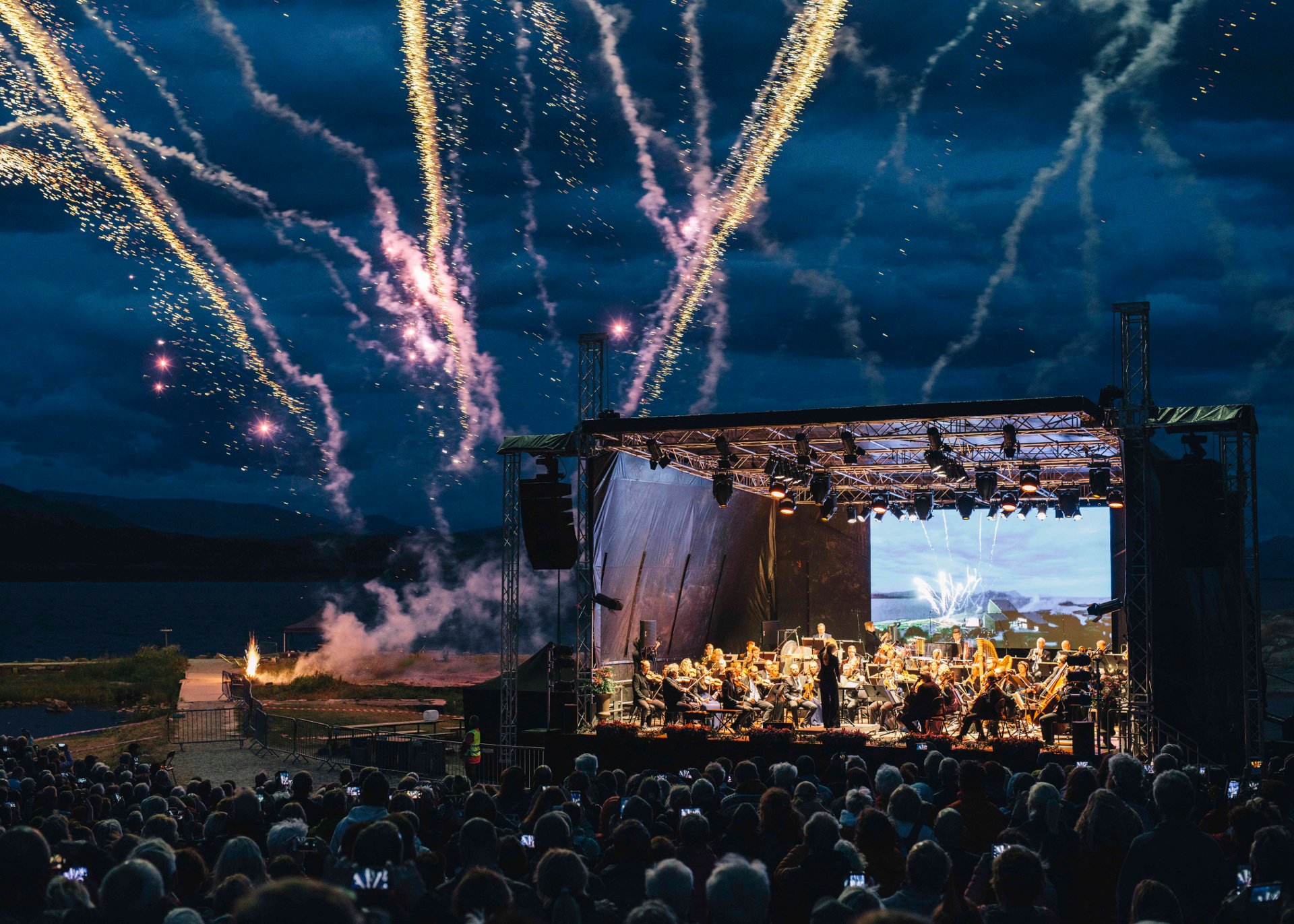Make Vardø Great Again
Vardø, Norway and Arkhangelsk, Russia once traded fish for timber and flour. Today, Russia practices attacks at what for centuries used to be the hub of eastbound economic and cultural cooperation. How did Vardø become an express bomb target for Moscow? The building of a new American radar is just a part of the answer.
And armed forces sign states that one may not take photos of the radar, though that is hardly to be understood in a literal sense.
Because it is the first thing you see when you arrive in Vardø, whether by sea, plane or in a car along the road past the Dome; this white giant cupola rising above Vårberget [‘Spring hill’] some fifty meters above Norway’s easternmost town.
It is almost impossible not to see the Defense’s radar facility from wherever you may be in town.
Just below the Town Hall, along the waterfront, Gry-Anita Kristiansen is directing paint boxes, flower holders and bags of soil. This is June and in a couple of weeks, the Pomor Festival takes place in Vardø. 46-year old Kristiansen, a woman who has at least one finger inside everything that goes on in Vardø, has gathered a bunch of friends to decorate the town.
Worn, old fences receive fresh strokes of paint, yellow flower boxes decorate street corners.
We ask her what she thinks of the radar. Kristiansen, Chairperson of Vardø Business Association and holder of a series of positions in NGOs of various kinds, weighs her words.
- This is the last stop before Russia. Vardø has a strategic position in the world. So, you can understand that it is there, she says.
Important tax revenues
Few people know how many employees there are at the Vardø radar. However, there is not much doubt that the armed forces are the biggest employer in Vardø, save for the local authorities. Thus, criticizing the radar may be a hard opinion to voice in a town with just over 2,000 inhabitants.
The local bank has paid for paint and flowers. The municipality’s debt amounts to more than € 30 million. That equals € 15,000 per inhabitant, according to figures from Statistics Norway. Tax revenues from people employed at or with the radar are most welcome at the municipality.
Kristiansen argues that Vardø should get more.
- The radar contributes with important jobs; however, it also takes up a large part of the area on the island. Perhaps the local authorities should receive an annual sum from the Defense in order to develop the town?
Tone Lise Rostad (51) was born and raised in Vardø. She now lives in Drøbak, near Oslo, but spends all her holidays up north.
- These days it is dangerous to have an official opinion about the radar.
- Why?
- Suddenly someone attacks you based on what you have said. People even attack for things you should not have said.
- Who?
- Different people. They attack you in the media too if you voice your opinion.
- So, it is hard to even talk about the radar?
- Yes, really.
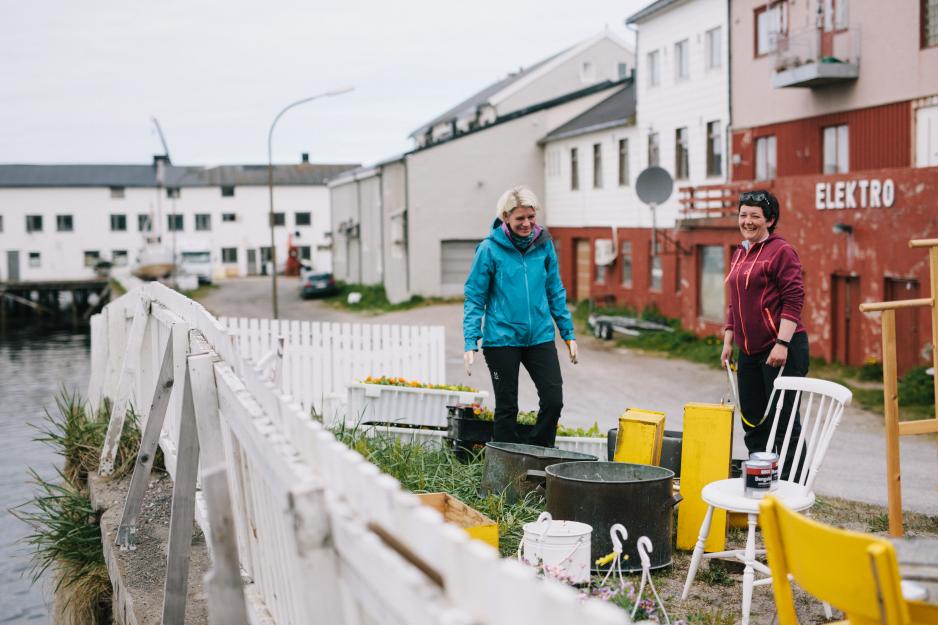
Tone Lise Rostad (left) and Vanja Elisabeth Jespersen help decorating Vardø.
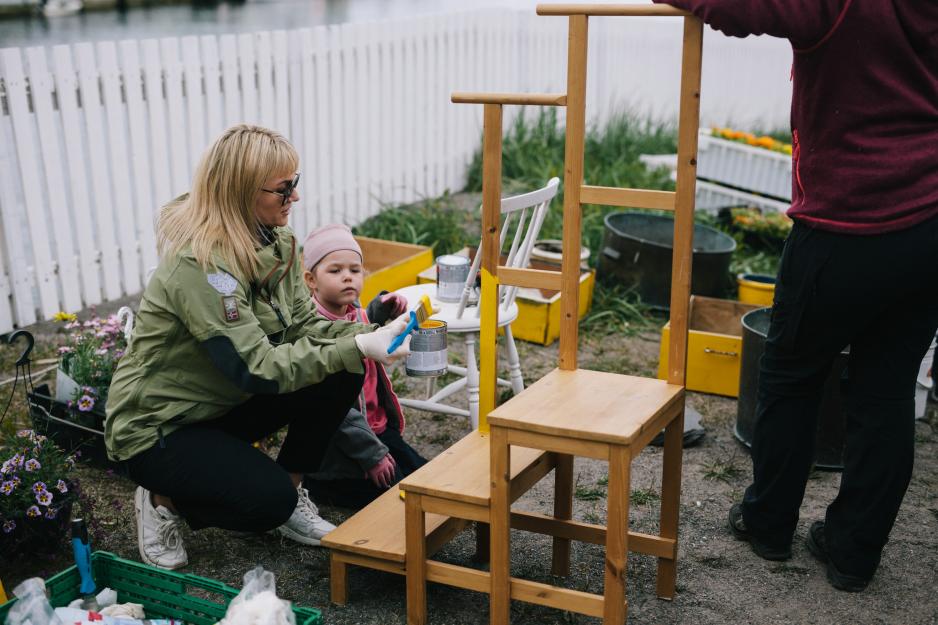
“Vardø in the World” is one of the chapters of the municipality’s new cultural heritage plan – exactly because it has such an important geopolitical position, says Gry-Anita Kristiansen.
A part of the town’s skyline since forever
The white radar cupola has been an integral part of the view of town in Vardø for decades. For an equally long period of time, Norway has been transparent about Norwegian authorities cooperating with the USA about what goes on at the Defense Station Vardø, which is its official name, just a few kilometers away from the Russian border when viewed from the air.
A new radar building has come up over the past year next to the old one, which has been in operation since the 1980s. The intelligence service says on its web pages that this is an upgrade and modernization of a system that has almost reached its expiry date. It is easier to see that the new building has a much larger dimension than the old one.
The official stance in Norway has been very elusive in providing information about the new radar facility. When the decision to build the radar was made in 2016, none of the Finnmark MP’s knew about it until the issue hit the media.
When Norwegian broadcaster NRK wanted to film the offloading of equipment for the radar, arriving in Vardø by means of an American vessel last winter, a transport worker tried stopping the reporter. The case was reported to the police, only to later be dismissed.
The equipment that is to be placed inside the radar has been developed and constructed in the USA. The assembling takes place using American engineers and technicians. Norwegian broadcaster NRK earlier this year reported that five American families now live in Vardø. Thus, it was perhaps to be expected that the rhetorical statements from Moscow were to become more outspoken and harsher, and to become more frequent than before.
The Russian Ministry of Foreign Affairs said as late as last May that the country will retaliate what it considers a military build-up along Russia’s borders.
However, was Norway prepared for Russian fighter planes to practice bombing Vardø, which happened both on 24 March 2017 and on 14 February 2018? Or was it prepared for the fact that the Russian Northern Fleet how has deployed a new missile system on the Sredniy peninsula just east of Kirkenes – 70 kilometers away from Vardø?
How has the town that once was Norway’s most important international town in the High North and hub of the lucrative Pomor trade between Norway and Russia for two centuries become Moscow’s preferred bomb target?
There is no doubt that Vardø is back on the geopolitical world map.
Rich on Russia
The people who work up there are just referred to as bird watchers.
If you do not know the past, you cannot understand the present, nor are you fit to shape the future, said the French philosopher Simone Weil.
And perhaps that has become Vardø’s destiny, a piece of the play between superpowers.
Ever since the Danish king decided to build Vardøhus fortress once in the early 1300s, Russia has been important for the development of Vardø. First as an outpost in the High North towards “the unknown” of the East, later as a center for lucrative trade with timber and flour for fish.
From the early 1910s onwards, Norwegian authorities grew increasingly worried about Russian influence in its High North. World War 1 and the Russian revolution were to become the beginning of the end of ties between Norway and Russia stretching centuries back in time.
Orthodox fast banned meat
Outside the Pomor museum, the Norwegian and Russian pennants drift in the wind. Museum hostess Ingrid Eikevik (20) is used to receiving visitors who know nothing about this particular part of Norwegian history.
- This was both an economic as well as a cultural center. The pomors brought flour and wood to Vardø, and as the Russian orthodox fast banned the pomors form eating meat, fish became an important trade commodity, Eikevik says.
As early as in the 1500s, this trade between Russia and Norway took on an organized form; however, it was only towards the late 1700s that the Russian connections started leaving their mark on Vardø. What was once a pure barter trade became money trade. Wine, tea, textiles and luxury goods also entered the market.
The Russian ruble was hard currency and Vardø had its own Russian bakeries. A unique language, Russian-Norwegian, was spoken amongst fish mongers and tradesmen, and Russia had its own consulate in town.
- At that time, Vardø saw a strong increase in welfare. Trade became crucial for people who lived here, Eikevik says.
Vardø was named Norway’s Pomor capital.
Eikevik shows us a cigarette box that can boast a special history. The box lid is adorned with the Russian eagle, the national coat of arms. On the back side, the names of the four daughters of Czar Nikolay II are engraved – Anastasia, Maria, Tatyana and Olga, and the date is 5 October 1907. The box is probably a gift from the czar to one of the officers on the emperor’s vessel ‘Polyarnaya Zvezda’ – the Polar Star. It was not uncommon for people who helped entertain the czar’s daughters to receive gifts like that.
How did it end up in Vardø? Probably brought there by nobilities following the Russian revolution and the Bolshevik ascent to power in 1917.
- There is not much doubt that Vardø would be more vivid today if the Pomor trade had continued, says museum hostess Eikevik.
We ask her about the Vardø radar.
- The people who work up there are just referred to as bird watchers. The radar is unfortunate for a town where the relationship with Russia is based on mutual respect. I can understand that the Russians are annoyed, Eivik says, and hastens to had:
- However, it is natural for it to be located there, given Vardø’s position, Eikevik says.
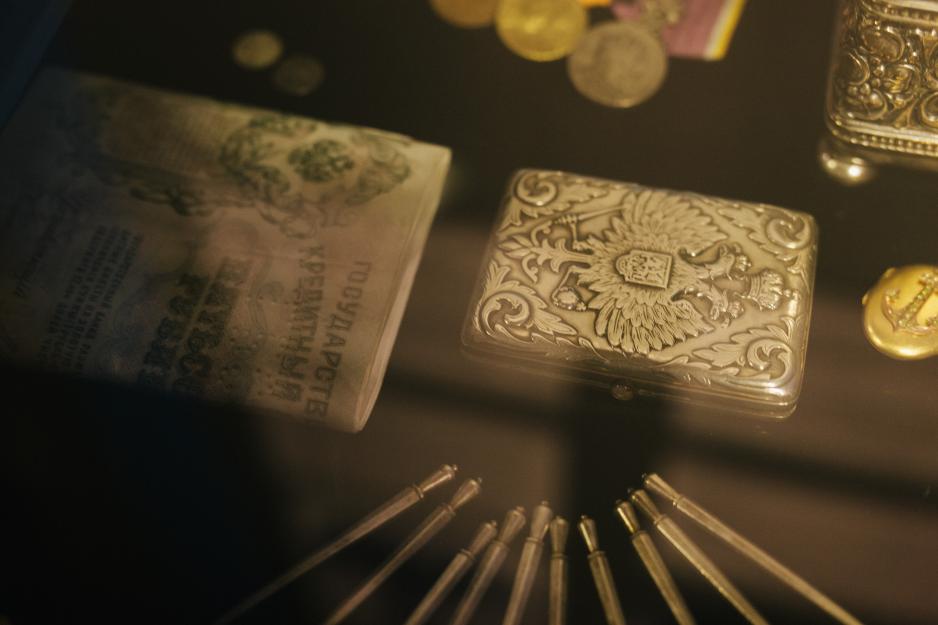
The Pomor Museum holds this item, amongst others, a Russian cigarette box from 1907 with the names of the four daughters of then-Czar Nikolay II engraved.
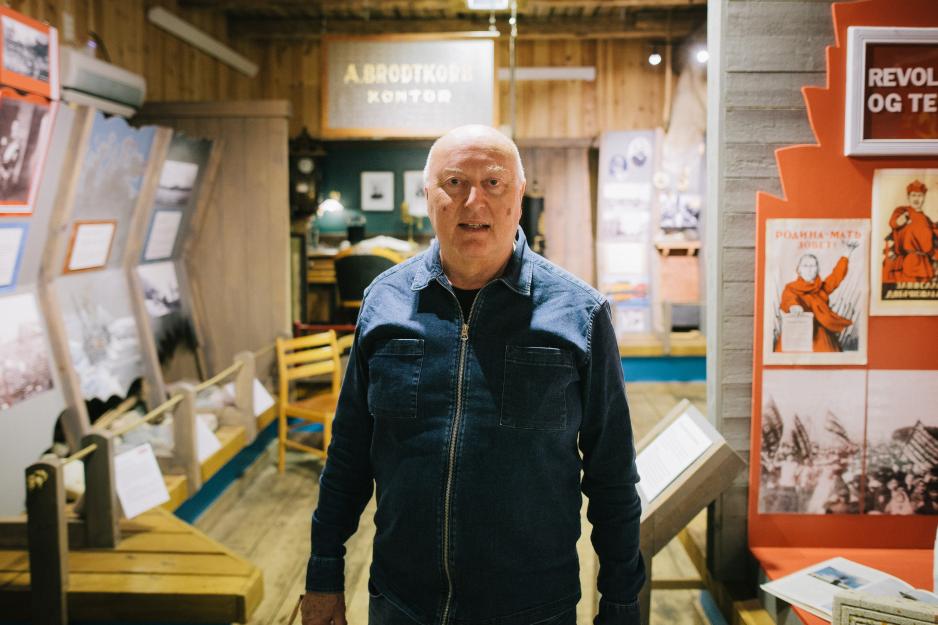
It is not like anyone believes that Russia will come here to attack us. However, Russia must show strength, says Yngve Træland.
- People object to wind turbines, but here?
Yngve Træland (69) just disembarked from Hurtigruten and arrives at the Pomor Museum. The man from Bergen on Norway’s west coast is in Vardø for the first time ever, and he holds a particular interest in the Norwegian-Russian relationship and the new radar in Vardø.
- I read that they were building a new radar. I am even so curious that I am going up there to see how close I can get before they chase me away.
- What did you know about the radar before you got here?
- I have heard that they built a radar and that the USA holds an interest in it. That it is gigantic, but it was even bigger than I’d thought. It obviously holds a massive capacity. I have no idea about the technicalities, but I wonder why they built it so big.
Træland draws a parallel to the extensive opposition against wind power that has left its mark on Norway over the past six months.
- It does not look good up there. Have ordinary people had any influence on this? People object strongly to wind turbines, but did anyone oppose this? It does not look good at all; it dominates the landscape very much. If I had lived here, I would have preferred for it to be built elsewhere, not in the middle of town here.
- 100 years ago, there was significant Russian influence here. Today, Russia is rather clear that it does not approve of the building of a new radar.
- Well, I completely understand that, because this is after all a form of spying. Would the USA appreciate it if Russia were to build a similar radar on Cuba or in Florida? They would object, of course.
- So, you do not believe that this is a Norwegian radar?
Træland laughs.
- No, does anyone imagine that at all?
- The Norwegian Defense says it is.
Træland roars with laughter.
- Well, they are paid to say so, aren’t they? We are not completely naïve. Norway does not operate it. You should not give up, you should ask the Norwegian Defense: “Well, then, why is it here? Why do we need it, what do we need it for? What are we checking up here, what are we looking after?” Right? That is just so naïve.
Træland laughs even more.
- Did you know that the Russian defense sent bombers to practice bombing Vardø?
- When did they do that?
- Last year.
- No, I never heard about it.
- The intelligence services published its report earlier this year, stating that on two separate occasions, Russia practiced bombing Vardø.
- Well, everyone holds practices. What was it called, that Norwegian exercise that took place here last year?
- Trident Juncture?
- Yes. That was practice too, though a lot more extensive, of course.
- What do you think would happen if Norway practiced bombing Murmansk?
- No one believes that the Russians will come here and attack us. Russia has to show strength, though they are a lot weaker than NATO. They have to keep it up in order not to lose their influence entirely.
- So this is just an assertion of needs?
- Yes. No one truly believes that Russia will bomb Norway. Does anyone think that? Do people believe that? Are people in Vardø afraid that they will come here and bomb us?
- You are not afraid to find out?
- No, I do not think so. No.
- But you do say that you understand that the Russians are annoyed about that radar.
- Yes.
- Then why is Norway building it?
- It is not Norway building it. That is just a formality. The USA is the one who wants this radar.
No one truly believes that Russia will bomb Norway. Does anyone think that? Do people believe that?
“The American war machinery”
Vardø is an arena for shadow boxing between the East and the West.
- The problems between Norway and Russia are an Oslo problem
Bjørn Bredesen (59), Vardø inhabitant and manager of North Norway’s oldest pub, the ‘Nordpol kro’ [the North Pole Inn] taps his finger repeatedly on the table to emphasize his point.
- An Oslo problem?
- Yes, an Oslo problem. Up here, we have had cultural and sport exchange with Russia since 1956. This, the Russians, they are our brothers. We are all of Russian descent, myself included. This is not a problem for us. This is more of a problem for central authorities. That is how I feel, Bredesen says.
Nordpol kro in Vardø resembles a museum, if you disregard the bar counter and the permanent group of men killing time during the day. Pictures from Vardø town dating back for as long as cameras have existed decorate the walls. Bredesen is the fifth owner of a pub that first opened its doors more than 160 years ago, and he is also a veritable encyclopedia about local and regional history.
- The house you are sitting in now is built with timber from Arkhangelsk. It can be dated back to 1864. In order to be licensed to involve in exports and imports, there were requirements about accommodation opportunities. Did I mention that Fridtjof Nansen spent a night here in 1895 when he was heading towards the North Pole with Fram? How do I know? He described the view from his bedroom window in a letter. You find the view in that direction.
Bredesen points out the window.
This house is the outcome of the Pomor era.
The American war machinery on the island
Bredesen speaks warmly about the intimate Norwegian-Russian friendship that has always existed in Vardø, and about the town’s position as a center of civilian cooperation with Russia.
He speaks less warmly of what he characterizes as “the American war machinery up on the island”, that is, the Vardø radar.
- I do not feel threatened by Russia. Right now, I feel more threatened by the USA. We have a president who on Twitter threatens to wage war against Iran.
Bredesen is quiet for a few seconds.
- Vardø is an arena for shadow boxing between the East and the West. Shutting down the border may destroy cultural and sports exchange with Russia, he says.
The pub owner nevertheless does not buy in to Moscow repeated utterings against the Vardø radar.
- Russia holds a formal commitment to having to be annoyed about the radar. It is just like the Conservatives and Labor whenever their parties present some political proposal. They have to disagree, regardless. I have been to Murmansk by boat. Along the Murmansk fjord there is a veritable forest of radars, Bredesen says and adds:
- Though I do understand that when American-funded war installations are constructed 30 kilometers from the Russian border … I can understand that there is a reaction.
Hard to run a pub in Vardø
Nordpol kro is one out of very few places in Vardø where the construction of a new radar can be noticed on the bottom line.
Temporary construction workers and engineers are happy to pop by for a pint after work. And the pub owner freely admits that this represent a welcome addition to the revenues. However, Bredesen would have wanted major investments like the Vardø radar to generate more money to the local community.
- When Statoil invested at Melkøya, they build a cultural hall in Hammerfest. When major corporations and companies involve themselves with major development projects, it is just natural for them to also contribute to the local communities. The defense depends as much on infrastructure in Vardø as I do, in order to make people work there.
- Does the town notice that a new radar is under construction?
- People who are in town to work pop by us too, every day. However, the Defense could have said to Vardø municipality: “Here are NOK 50 million! Spend it on infrastructure, pay debts, create jobs.” This project generates too little back to society, they do not pay property taxes. They have the most attractive plot in town! The municipality only receives tax revenues from workers there, and that is not enough in my opinion. This was Norway’s largest fishing village with some 4,000 inhabitants. Today, there are only 2,000 and we are but a shadow of ourselves.
Bredesen points out the window, towards the radar facility.
- There were more than 90 soldiers up there when I grew up. There was a whole formation – a much bigger employer than what it is today. Back then, the Norwegian Defense was in control there. Today, the USA runs the caboodle.
- You think so?
- I am convinced of it, I am not just guessing. Why on earth do you think there is no trace of this investment on the state budget? Why do you think there are five American families in Vardø now? Why do you think the American military attaché arrives here by helicopter? This is dollars.
- Would Vardø be a better place without the radar?
- That is a difficult question. This is a society that has been down with its back broken, and a lot of people work up there, providing tax revenues to the municipality. I’d be superficial if I said society would be better off without it. But at the same time, they hold the coolest plot of land around here, one that could have been used for tourism. Let me put it this way: I do not think Vardø would be a worse place without that radar, Bredesen says.
Bredesen is only the fifth owner of Nordpol kro. Since its opening night more than 160 years ago, it has only been run by two families ever. But when 59-year-old Bredesen retires in a couple of years, the inn will slip from the family’s hands. Running a pub in Vardø is hard.
- In 1993, we had a turnover of NOK 5 million. Last year, it was 4 million. I have run this place since 1985 and seen both its prime and its downfall. It has been a struggle to make ends meet. None of my children want to take over.
- Is that sad?
- Yes, but that’s how it is. Nothing lasts forever. My job is to make sure the company is the best it can be when someone else takes over, so that Nordpol kro can remain open for another 160 years.
- When the radar is built and the technicians go home, then what?
- Then we will be back to normal and the town will be calmer.
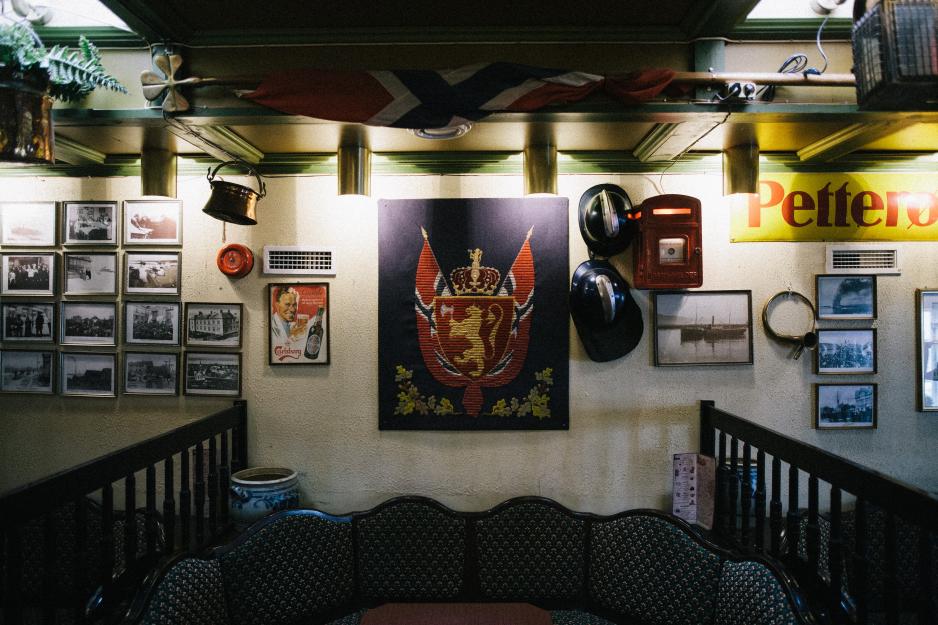
Nordpol kro has been run without interruptions for more than 160 years.
They are the future of the town
- We have been doing this to each other since WW2, says Gabriel Kristiansen (16).
A handful of youngsters are gathered for a BBQ party at Skagen near Drakkar, an enormous wooden monument with remains of a Viking ship, a dinosaur and a whale, positioned against the sky, created by Russian artists from Arkhangelsk.
- We have a good view towards Russia. That is good for Norway’s security, though it may be both an advantage as well as a disadvantage. But I do not give it much thought, Daniel Myhre (16) says.
- This provokes Russia. If anything were to happen here, it would hit us – and not the USA, says Erik Lund (16).
- It is good to live in Vardø. But I fear the threats from Russia, says Simone Myhre (17).
- Relax. If Russia wanted to bomb us, they would have done it a long time ago, says Gabriel Kristiansen.
- Do you picture yourselves with a future in Vardø?
- I picture myself with a new job, says Preben Røtvold (19).
- Russia wants to show off and say that this is not okay. But this probably has as much to do with the fact that Vardø is of interest to many; Americans, Russians and Norwegians, says Daniel Myhre.
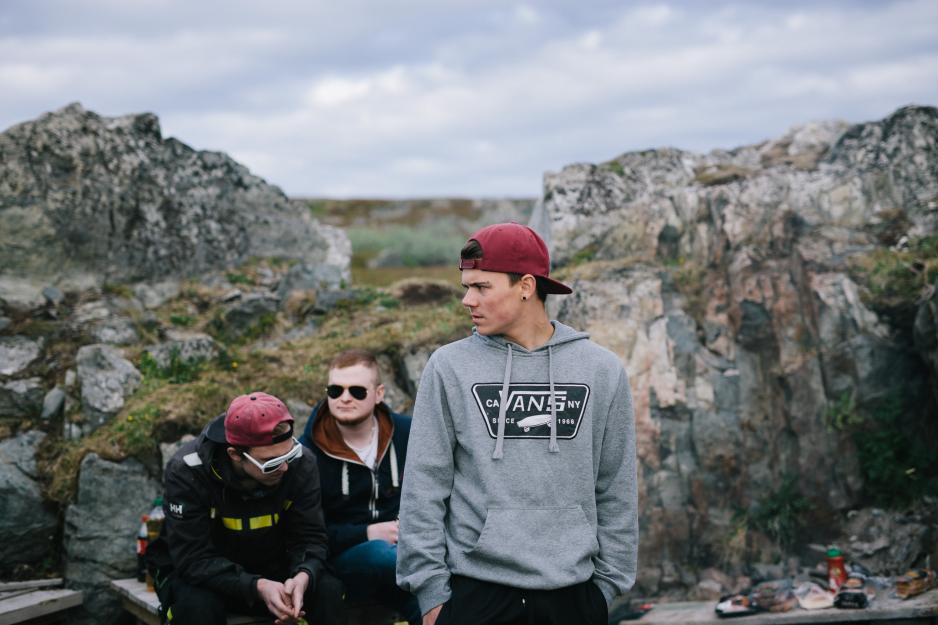
- We have a good view towards Russia. That is good for Norway’s security, though it may be both an advantage as well as a disadvantage, says Daniel Myhre.
Russia has become more aggressive over the past few years. That makes it our goddamn duty to make sure we keep our guard high.
The radar poses a real challenge for Russia, says Iver B. Neumann, political scientist, social anthropologist and Russia-expert. He argues that Norway has to take it seriously when Russian authorities in no uncertain terms criticize the construction of the Globus system in Vardø.
- The radar is very advanced, and Norway has a tradition of passing on raw material to the Americans. The Vardø radar is an important issue in the Norwegian-American relationship, and also in our relationship with NATO, says Neumann, who argues that allied countries expect Norway to contribute with information from the Vardø radar.
Today, Neumann is Director at the Nova Welfare Institute at Oslomet university, but next year he will assume his position as Director of the Fridtjof Nansen Institute. Neumann comments like this on the Russian simulated attacks on Vardø:
- The Russians always use the military, because that is all they’ve got. It is like the American saying: “When the only think you hold is a hammer, everything looks like a nail”. Other countries can give a variety of signals and use various tools to have things their way, but Russia only has its military. Thus, simulating attacks becomes a very strong signal.
- Why is Russia practicing like this against Norway?
- We share a border with Russia and Russia perceives it as a direct threat that they are listened in on and spied at, Neumann says.
- Russian MFA said early May that the construction of the new Vardø radar will lead to retaliation – is that a statement for internal policy purposes, or is it aimed directly against Norway?
- I would argue that it is a statement in an internal Russian debate in which the leadership wants to appear strong. However, it is also a clear signal to Norway that Russia is not happy with developments. Norway should not let that sway our decision; however, we should take note.
- What should Norway do?
- Russia has grown more aggressive over the past few years. That makes it our goddamn duty to make sure we keep our guard high. One of the ways in which we do that is through being a member of a military alliance. In order to be member of a military alliance, we have to pool resources. And one of the resources we contribute with is electronic intelligence. I think we should continue doing so, Neumann says.
The Russians probably know more about the radar than we do in Vardø.
- It is far from Vardø to Oslo, but even further from Oslo to Vardø.
Åge Jakobsen (66) does not really want to speak with us. He is in a hurry. His boat, a Malo 28, must be hoisted onshore, washed, painted and greased before he goes on summer holidays.
He has a lot of opinions about the Vardø radar. But prefers to keep them to himself.
- But you can write: “Remember who liberated us during the war.” You can quote me on that, Jakobsen says.
Outside the local bakery we meet Stine Vasshaug (27) and her daughter Josefine (2). Josefine refers to the Vardø radar as “that ball up on the mountain”.
- It is hard to have an opinion on something you do not know anything about. I don’t walk around thinking this a target for attacks. I have a small child and like everyone else who has small children, we walk around in our own bubble, Vasshaug says.
Astor Pettersen (79) is a retired fisherman. He spends his days planning his own 80th anniversary. When that is not on the agenda, he spends his time on a chair outside Strandtorget shopping mall.
- I guess the Russians know more about the radar than we do in Vardø. There are a lot of rumors around. Nor do I have any interest in it either, he says.
Though some things are hard to miss.
- There was this American ship bringing the equipment, but we are not to busy ourselves with this. This is a military thing, what were we to do up there?
- Russia has threatened to attack the radar.
- Did they? I do not pay so much attention. I care more about who runs the USA. He’s a badass, isn’t he? Hahaha, Pettersen giggles.
Clouds the debate
Dagfinn Åseli (79) comes treading on a home-made electric bicycle up towards the grocery store, which lies just beneath the Globus radar.
- I have grown used to the radar. Though it would be nice if the authorities were more sincere in their information about it. Norway has been very cloak and dagger about it. We are used to fog here in Vardø, but we do not appreciate people who try to evade the factual circumstances. They should have said straight out that our mates in the USA want this radar in order to have a better view towards the East.
- So, this is not about looking at things in space or other things?
- Well, it kind of is, but the main reason for its being there is that the USA wants to strengthen its military position, to be blunt about it.
- You do not believe this to be a Norwegian radar?
- No!
- The Defense says that it is a Norwegian radar.
- Well, you can twist your words in a technical sense; however, the radar was built, paid for and operated by the Americans. You cannot claim then that it is Norwegian. Formally, it may appear to be Norwegian but in reality, the USA manages the radar. There is no doubt about that.
- Should not Norway permit the USA to build a radar on Norwegian soil?
- Sure, but then Norway should say to Norwegian men and women that we have permitted the Americans to build a radar used for a bit of this and that.
- Why do you think one chooses not to say so, if that is true?
- You tell me. I think they would benefit from saying how things really are. People know anyway. I find it hard to understand why they have to be so cloaked and dagger about it, Åseli says.
We are used to fog here in Vardø, but we do not appreciate people who try to evade the factual circumstances.
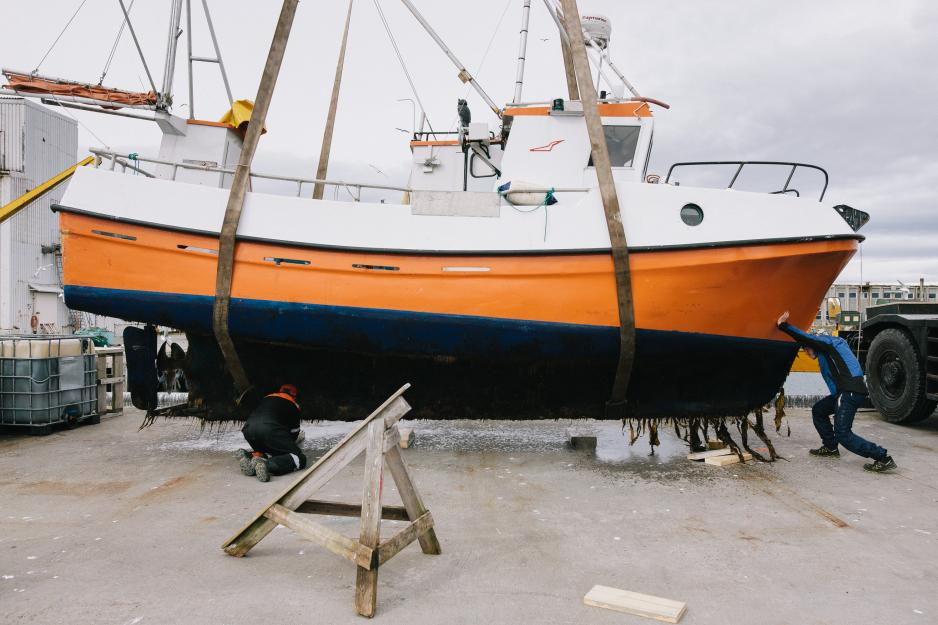
Åge Jakobsen gets help hoisting his boat onshore.
Ståle Ulriksen is a researcher at the Norwegian Naval Academy and well familiar with the military structuring of the Arctic. He explains that Russia has strategic submarines that are able to reach mainland USA with nuclear bombs, and that these submarines are stationed just across the fjord from the Vardø radar.
- This is, in many ways, Russia’s life insurance, meaning that they are able to strike back if their land-based nuclear capacities are hit first. That is how terror balance works, Ulriksen says.
- Is there any reason to think that Norway needs to build such an expensive facility in a place like Vardø to monitor things in space?
Ulriksen giggles.
- You could say that again. It is obvious that that Russians will react negatively to this. This radar is right in their back yard.
Ulriksen points to the balance based its Cold War military logic on; one in which NATO exercises in Finnmark County were banned, as was the use of American bombers in exercises.
- Norwegian authorities did this to calm Russia. Now Russia claims that Norway is making a breach with this old doctrine.
- When Russia claims that Vardø with the construction of the new radar is a legitimate bomb target – is that just empty talk, or is this a realistic threat?
- This is not just talk. Russia’s reacting to 330 American soldiers at Værnes is just talk. But the building of the Vardø radar is much more noticeable to Russia. In many ways, this goes to illustrate Norway’s defense problem. Russia has military capacities on the other side of the border that have nothing to do with us in Norway, yet they are there. The dilemma in our defense policy is that we make ourselves so dependent on allies. It would be more predictable and less provoking to Russia if Norway had a defense strong enough for us to not need a big allied presence in times of peace.
- And then perhaps it does not help that American families have now moved to Vardø?
- That will worry them more of course, though whether or not there is reason to fear I would not know.
- Is this fear of conflict rational?
- It is important not to demonize the Russians. It is not likely that a war will break out between Russia and Norway over things we disagree about. However, a war may spill over from other areas into ours. The Vardø radar will then be something they cannot tolerate, and it could easily blow up, Ulriksen says.
The researcher argues that one of Norway’s problems is that Norwegian citizens no longer constitute “NATO in the High North”.
- Through having a strong Norwegian defense, we appear predictable and the Russians will understand that. If our military presence in the High North is not sufficiently strong, others will be there, be they Frenchmen, Brits or Americans, who the Russians are not used to having in their backyard. And then we change the game.
Vardø as a verbal battlefield
Gifts from Russian cooperation partners are lined closely up on the desk at the mayor’s office. Mayor Robert Jensen from the Labor Party flips the pages of a book he received during one of his visits to the closed Russian town of Severodvinsk – where Russia builds her new strategic nuclear submarines.
The formal ties of cooperation on local level between Vardø and several towns in Russia exist in good shape, Jensen tells us.
- We have always had peaceful co-existence with Russia. Norway has the world’s best neighbor and we will keep having that. Now that we are celebrating our 230th anniversary, the mayor of Severomorsk (the main base for the Russian Northern Fleet, journ.note) will be coming here.
- What do you know about the radar that you cannot tell others?
- I do not know anything that I cannot pass on to others.
- Nothing?
- No. I receive as little information about what goes on up there as the next person. It is not like the intelligence services or the Defense are sharing information with us. I can tell everything that I know about the radar.
- What do you know then?
- I know that the radar is operated by the intelligence services and that Norway cooperates with the USA about it. American dollars have covered a lot of the expenses and the official version is that the radar is studying waste in space – in other words; that one looks at the orbit of various installations and calculate where they are at any given time.
- Nevertheless, we are not so stupid so as not to know that the radar also has another mission given its strategic location. There are also a lot of radars on the Russian side, monitoring space and the situation around them. It happens on both sides of the border, Jensen says.
- When the intelligence services last year announced that Russia has practiced attacking Vardø, what did you think of it?
- I found it provoking. It caused insecurity and people started talking. We became interesting for the media, though perhaps less interesting for those who want to invest here and do not know the local conditions. “Something non-transparent goes on here.” People are afraid at the idea of moving here. I have told the defense minister that we cannot keep having it like this.
- You were provoked by the Norwegian defense presenting information about Russia having practiced attacks on Vardø?
- During the Cold War in the 1960s it was probably much worse. If everything that took place back then had become public knowledge at the time, we would probably have left, one and all. Back then, that was really practicing.
- If Vardø’s local authorities were to decide that they do not want a radar in town, what happens next?
- I guess we do not have a say in this. The state takes what it wants, that’s how it goes.
- You did not process a case when they were to build a new radar?
- They had received a stamped approval from the technical division like anyone else who have to apply for approval. However, as long as the area in question is regulated for that purpose, we cannot refuse the Defense to set up a building exactly like the others. This has been through a regular process in our administration. It is more or less a formality.
- How much money does Vardø municipality make from the Defense’s having a huge radar facility in the middle of town?
- Much like many other municipalities we do not have a tax for the property itself. Nor do we get a special allocation from the State just for its presence here. Vardø has some inhabitants who are employed there. The state has centralized purchasing agreements, so I do not know how much shopping they do locally. The hotel in particular has profited the most from this. Some money is returned to society in this way.
- But the municipality does not receive any money for the new radar being built?
- No.
- Should you have?
- Yes, we have been to the defense minister to tell him that. Both because they are present here and because they Defense is more aggressive in its strategy, which makes Vardø a verbal conflict area.
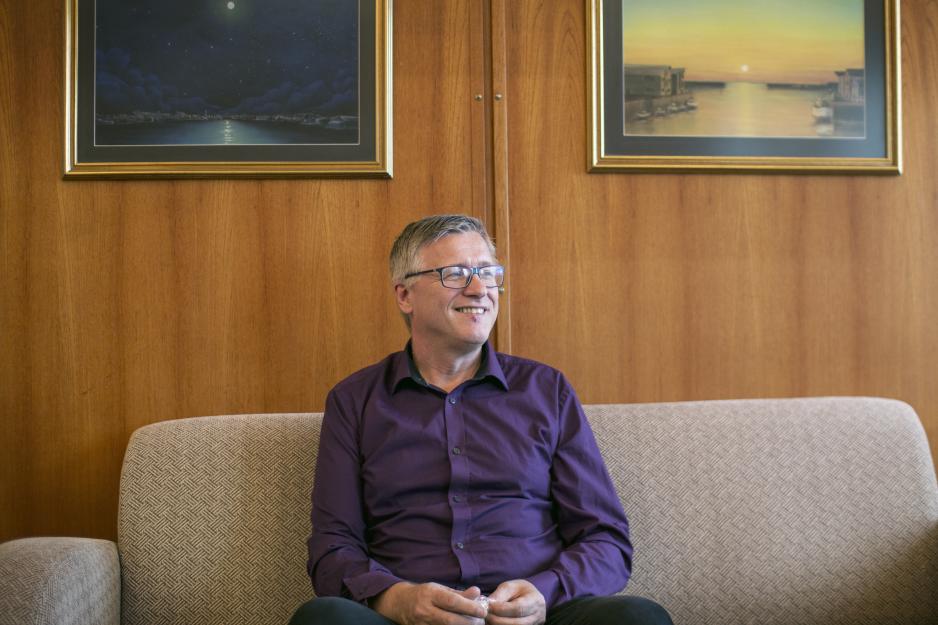
We are not so stupid so as not to know that the radar also has another mission given its strategic location, says Vardø’s Mayor Robert Jensen. (Photo: Amund Trellevik)
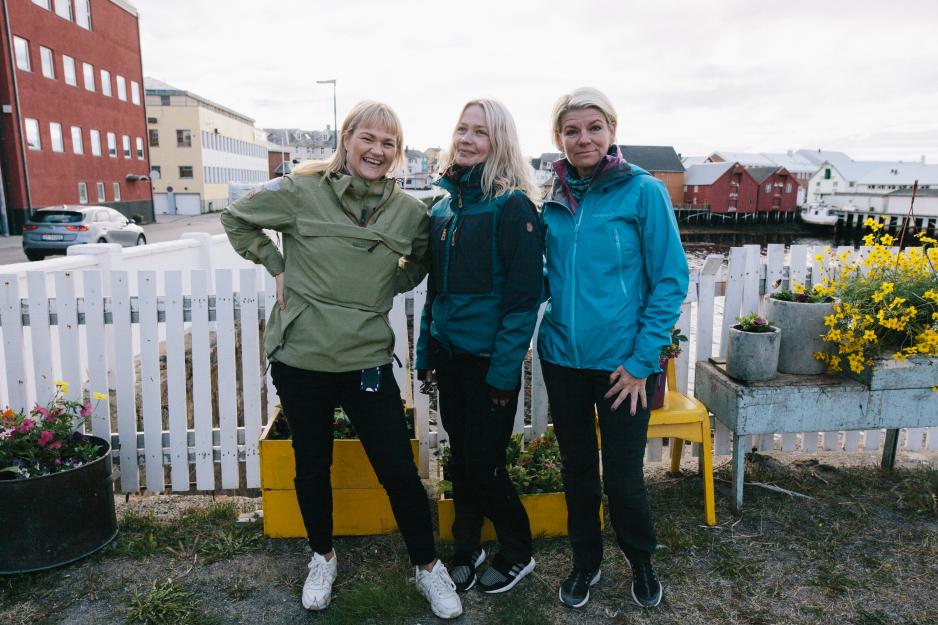
Gry-Anita Kristiansen, Monica Esbensen and Tone Lise Rostad make sure Vardø is properly decorated before the Pomor Festival.
Monica Esbensen (37), active local politician in Vardø, visits Gry Anita and Tone Lise.
- One can say different things about the radar, though the town has surely noticed that it is there. In a good way, I would say. The hotel and restaurant are filling up, and the pub has made money on days that may otherwise have looked bleak. That is the good part. But if it outweighs the potentially negative aspects – I cannot answer that.
- What are the negative aspects?
- No, I don’t know. But there are all these rumors about this thing and that.
- The Russian military has practiced bombing Vardø.
- I did not read that article.
- Why not?
- I do not want to think about it. It is not an issue.
- Are you afraid?
Esbensen goes quiet for a few seconds.
- Yes, that is probably why. Of course, it makes you worry. There is a reason why I did not click on that article when it appeared on the internet. If that was fear-based…? Now, ouff, I have enough worries already.
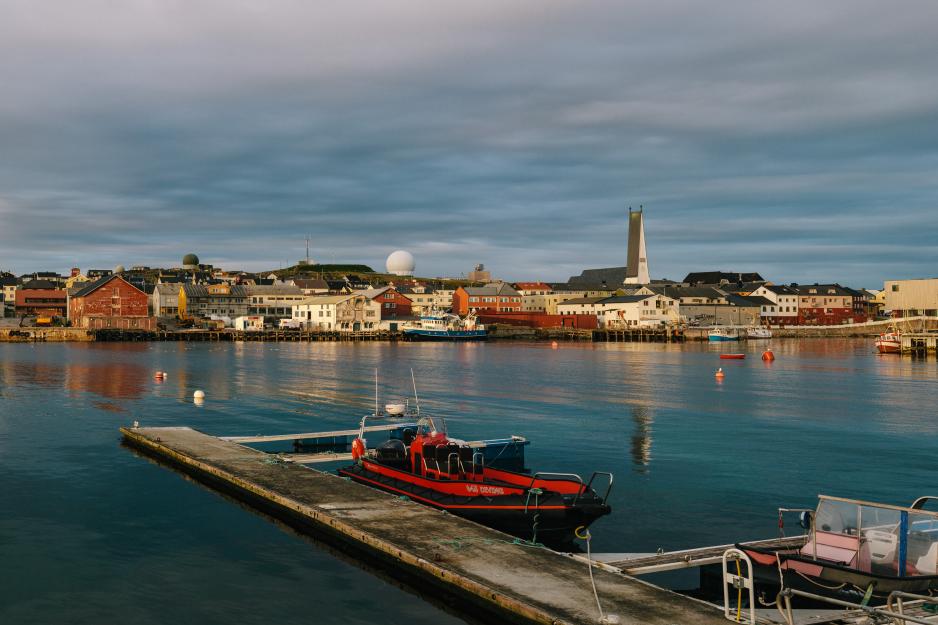
Vardø is the only town in Norway with a so-called Arctic climate zone, meaning that the temperature in the warmest month of the year does not exceed ten degrees average. The midnight sun nevertheless makes Vardø nights a majestic experience.
High North News has transmitted the following questions in writing to the military intelligence services (see fact box) in relation to this article.
Head of Communications, Ann-Kristin Bjergene, of the intelligence service response per email.
Her response is quoted in full below.
As for your questions regarding staff related to the upgrading of the Globus system in Vardø, we can say the following. There will at times be a need for technical personnel from the USA to be present in order to install. In the installation phase and up until the radar is fully operative, the number of Americans in Vardø will vary. These personnel consist exclusively of civilian technicians who will leave their station once their assignment is completed. Some of these have, for personal reasons, chosen to bring their families over.
The gathering and sharing of intelligence is fully conducted in within the frame of our legal foundation and our mission in society. The Norwegian Parliamentary Oversight Committee on Intelligence and Security Services receives continual updates on activities. The Committee also controls the sharing of data with foreign cooperating services.
Sharing of data only takes place following a specific assessment. We have full national control over what is shared, and data is only shared when this is considered to be in Norway’s interest.
The intelligence and security services are subject to regulations stating that information shall not be shared if there is a genuine risk, based on circumstance, that the sharing will lead to individuals being subject to violation of basic human rights.
As for your other questions I kindly refer you to our web pages. There you will find un-graded information about the function of Globus as well as information about the modernization. You are also free to contact Vardø Business Council when it comes to positive local ripple effects.



